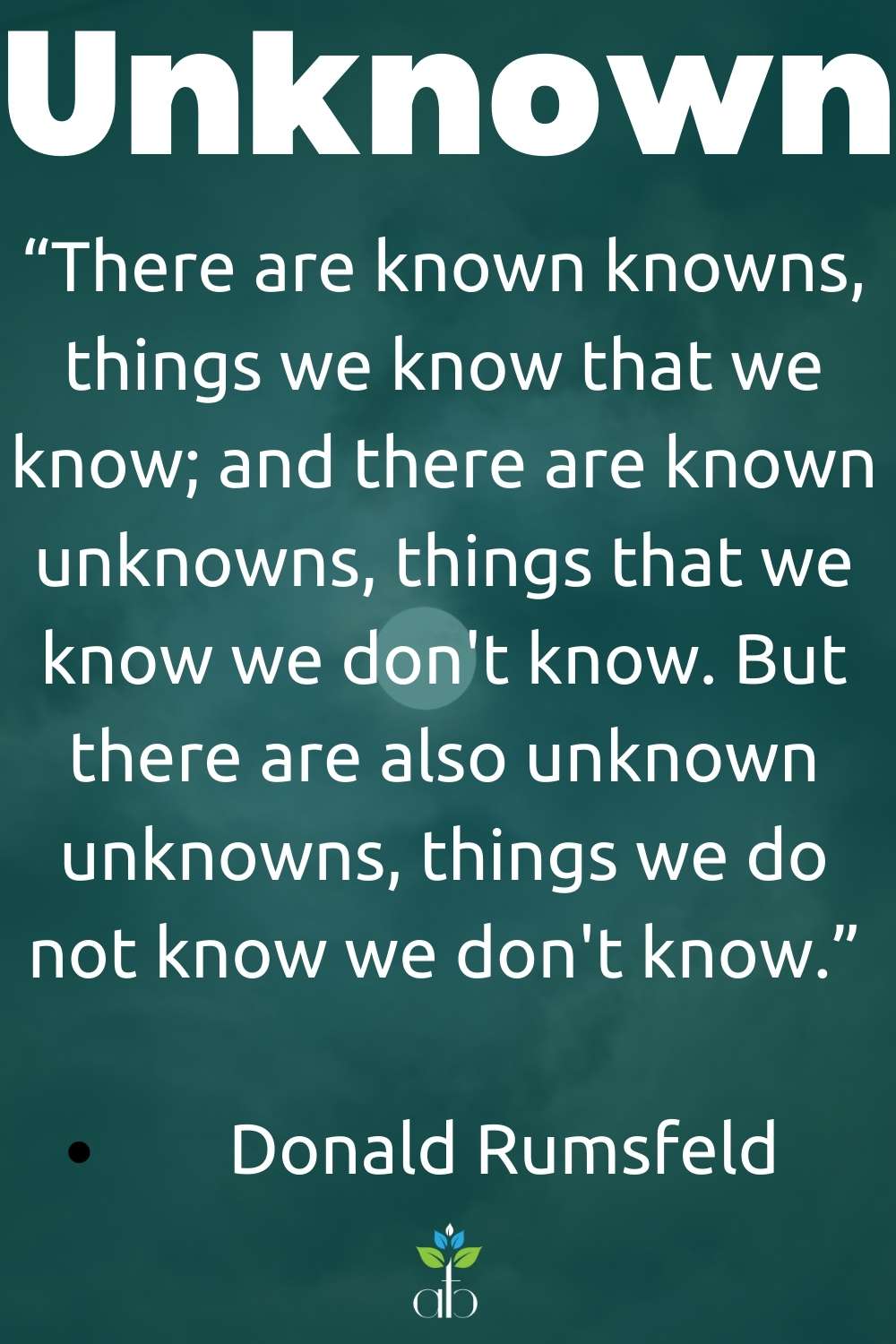Episode 454
What We Might Not Know

We have access to certain information, so we don’t always pause to think about the information we don’t have. Once we do pause to think about it, we can realize very quickly that there might be a lot we don’t know.
As Donald Rumsfeld said in his wisest and most-disparaged quote: “There are known knowns, things we know that we know; and there are known unknowns, things that we know we don’t know. But there are also unknown unknowns, things we do not know we don’t know.”
Even in a mundane situation, such as someone being rude to us, we can ask ourselves “What might we not know?” Perhaps that person is normally very nice, but just having a really bad day or struggling with grief. Or perhaps that person is rude to everyone, and there’s absolutely nothing personal about it.
Don Miguel Ruíz reminds us in The Four Agreements, we should not make assumptions. Unfortunately, that is tricky and even impractical, because we’re not always aware of what we assume. A more practical tip comes from Difficult Conversations, in which the authors tell us to assume that there are things we do not know.
this is where the embedded
player should go
Transcript
Welcome, beautiful thinkers!
I’d like to talk to you about this concept, what we might not know, because a lot of the time, there are things that we do not know, we might occasionally make the incorrect assumption, that we have all of the data about a situation.
But basically 99% of the time, probably even 100% of the time, we do not know everything, there are known knowns, known unknowns, unknown knowns and unknown unknowns
So, in Don Miguel Ruiz’s book, he discusses the Toltec agreements, and one of the Toltec agreements is don’t make assumptions, which is actually very difficult to do.
This is the nature of assumptions that we aren’t always conscious of them.
We don’t necessarily consciously make assumptions, and there might be things going on in the situation.
We think we know what’s going on.
But it’s just an interpretation that we’ve come up with.
I like this alternate phrasing, which is a little bit different, but it can lead us to a similar place.
In the book difficult conversations. It talks about this, it says, “Assume that there are things we do not know.
And so often, that’s the case, that there are a lot of things we don’t know.
And if we knew them, well, maybe we’d have a bit more peace of mind.
The other day, I was at the conference and at The Greater Reset in Morelia, and one night, went out drinking with some buddies got a bottle of mezcal thanks to Ernesto and Feddersen, who shouted us a bottle of mezcal and said, “Oh, why don’t we have some beers?”
And this is how Mexicans drink hard liquor with beer on the side to wash it down, you know, something a little more smooth.
Anyway. I got quite drunk, we went to this other bar, and I met this woman, and I introduced myself.
But the next day, I guess I didn’t, it didn’t fully click with me that I’d met her or just wondered, how drunk was I?
How much of a fool did I make most of myself last night?
And now if I talk to this woman, maybe it’s going to make her uncomfortable.
When I see her at the conference, I don’t say hi to her.
Meanwhile, in her head, her story of what’s going on she’s like, “Oh, did I annoy Kurt? Is that why he’s not talking to me anymore? Like, did I say something silly?”
So we both have these stories going on, in our heads about the events.
Is only when we finally did get to talk to each other. She mentioned that to me. And I was like, “
Oh, no, it’s you know, it’s not that at all. Something completely different was going on.”
And we were both mistaken, both kind of detached from reality, in some sense, I suppose.
So, these things can happen all the time.
There’s a classic example I like to use in workshops when I’m talking about techniques from cognitive behavioral therapy.
And I asked this question, “What is it that we might not know about this situation?”
So for example, somebody cuts you off in traffic and gives you a middle finger?
What is it that you might not know, maybe that fellow has been under a lot of stress? Maybe his wife just left him? Or maybe this is another example. Maybe he’s just an asshole. This one.
I’ve seen people say, and you know, this is important too, because if the guy is nasty to everybody, so much more reason not to take it personally, which is one of the other Toltec agreements.
“Take nothing personally, nothing is personal. Nothing is really about you or your ego.”
It’s not really about that.
I do remember this other strange example.
Years ago when I was in my hometown and I had some friends and I learned that one friend knew another friend and I asked one of these women, “Ah, you must know this person.”
And she says, “Oh, yes, but, you know, we have mutual friends, but we don’t really get along, you know, I always get the feeling that she feels threatened by me.”
And weeks later, I was in a conversation with the other person involved.
And I asked this woman, you know, when when you think like, you know, what’s the face, and she says, “I always get the feeling she feels threatened by me.”
But both of them had the same preconception about the other, which, they things in common, really, they could have been friends.
But this is the kind of bizarre stuff that happens when we think we know, when we assume a little too much.
So maybe, we don’t know what’s going on in people’s heads.
Maybe we don’t know what’s going on in the world.
If we can let go of our certainty, for a little bit, we might actually find a pathway to happiness or friendship or greater connection, or release of things and unimportant.
When we think about what we might not know.

New Episodes Every Weekday
11am Mexico City time
10 min episodes Monday - Thursday
1 h interview episode on Fridays
As an Amazon Associate I earn from qualifying purchases.
Stay Beautiful &
Stay Connected
